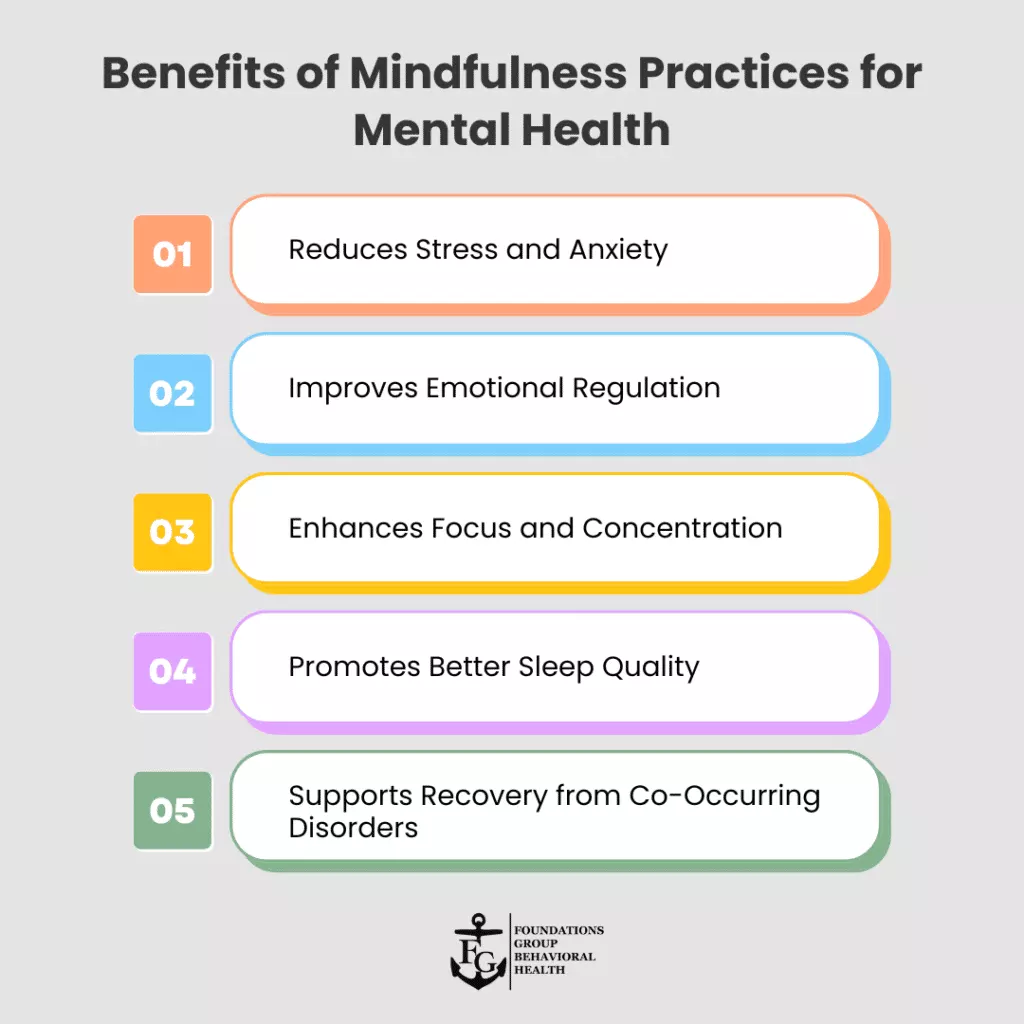In an era marked by rapid technological advancements and constant demands on our attention, mental health challenges are becoming increasingly prevalent. Anxiety, depression, trauma, and sleep disorders affect millions, prompting the need for effective strategies to enhance mental well-being. One powerful and accessible approach that has gained considerable recognition in recent years is mindfulness. At Foundations Group Behavioral Health, we understand the value of integrating mindfulness into our treatment offerings, including our Psychiatric Day Treatment and Half Day Treatment Programs.
What Is Mindfulness?
Mindfulness is the practice of being fully present and engaged in the moment, acknowledging your thoughts, feelings, and surroundings without judgment. This approach encourages individuals to observe their experiences without becoming overly reactive or overwhelmed by them. Originating from ancient meditation traditions, mindfulness has become widely recognized for its therapeutic benefits in managing mental health conditions.
At its core, mindfulness cultivates a non-judgmental awareness that allows individuals to develop a more profound connection to their thoughts and emotions. By focusing on the present, individuals can reduce stress, enhance emotional regulation, and foster resilience, making mindfulness a powerful tool in mental health treatment.
Different Mindfulness Practices for Mental Health
Mindfulness encompasses a variety of practices that can be tailored to individual preferences and needs. Here are some common types of mindfulness practices:
- Mindful Breathing: This involves paying attention to your breath, observing each inhalation and exhalation. It serves as a grounding technique that helps anchor your thoughts and calm your mind.
- Body Scan Meditation: In this practice, individuals focus on different parts of their bodies, noticing sensations, tension, and relaxation. It promotes body awareness and helps release physical stress.
- Mindful Walking: This practice encourages individuals to engage fully with the act of walking, paying attention to the sensations of movement and the environment around them. It can be a refreshing way to integrate mindfulness into daily activities.
- Guided Meditation: In guided sessions, individuals listen to an instructor or recorded meditation that leads them through mindfulness exercises. This can be especially beneficial for beginners seeking direction.
- Mindful Eating: This practice encourages individuals to savor each bite of food, paying attention to flavors, textures, and feelings of fullness. It can help foster a healthier relationship with food.
5 Benefits of Mindfulness Practices
Mindfulness practices have become increasingly popular in recent years, and for good reason. These techniques, centered on maintaining a non-judgmental awareness of the present moment, offer a multitude of benefits for those who integrate them into their daily routines. Here are five key advantages of incorporating mindfulness practices into your life:

1. Reduces Stress and Anxiety
Mindfulness practices empower individuals to anchor themselves in the present moment, which is crucial for managing stress and anxiety. By focusing on the here and now, individuals can let go of the burdens of past regrets and future uncertainties. Here’s how mindfulness achieves this:
- Mindful Breathing: Simple breathing exercises can activate the body’s relaxation response, helping to calm the nervous system. This practice can lower cortisol levels, the hormone associated with stress.
- Meditation Techniques: Regular mindfulness meditation has been shown to decrease anxiety symptoms significantly. It encourages a non-judgmental awareness of thoughts, enabling individuals to observe their anxious feelings without becoming overwhelmed by them.
Research supports these benefits, indicating that individuals who engage in regular mindfulness practice report lower levels of perceived stress and anxiety. Our Anxiety Treatment Program incorporates mindfulness exercises, equipping clients with the tools to manage their anxiety effectively.
2. Improves Emotional Regulation
Emotional regulation is a vital skill in maintaining mental health. Mindfulness enhances emotional intelligence by fostering awareness of one’s thoughts and feelings. Here’s how it aids in emotional regulation:
- Recognizing Triggers: Mindfulness helps individuals identify emotional triggers, allowing them to pause and reflect before reacting. This awareness promotes thoughtful responses rather than impulsive reactions, which is particularly beneficial for individuals dealing with Depressive Disorder Treatment Programs or Bipolar Disorder Treatment Programs.
- Practicing Acceptance: Mindfulness encourages acceptance of emotions, which can reduce the tendency to suppress or ignore them. This acceptance allows individuals to process feelings more constructively, reducing the likelihood of emotional outbursts or mood swings.
Incorporating mindfulness into therapy helps clients develop healthier coping strategies, enhancing their emotional resilience and promoting stable mood regulation.
3. Enhances Focus and Concentration
In our distraction-filled world, the ability to focus is becoming increasingly elusive. Mindfulness practices cultivate attention skills, which can have profound implications for mental health:
- Attention Training: Mindfulness meditation trains the brain to focus on a single object, such as breath or a mantra. This training translates to improved concentration in daily tasks and interactions.
- Cognitive Flexibility: Mindfulness encourages flexibility in thinking, allowing individuals to shift their focus when necessary and adapt to new situations more readily.
For those experiencing cognitive difficulties due to Sleep Disorder Treatment Programs or Trauma Disorder Treatment Programs, mindfulness can significantly improve cognitive functioning. Clients in our Outpatient Mental Health Program often report enhanced focus and productivity as a direct result of mindfulness integration.
4. Promotes Better Sleep Quality
Sleep disturbances are prevalent among individuals with mental health conditions. Mindfulness practices can be effective tools for improving sleep quality:
- Relaxation Techniques: Mindfulness encourages relaxation through guided imagery and body scans, which can help individuals unwind before bedtime.
- Cognitive Restructuring: Mindfulness can alter the thought patterns that lead to insomnia. By recognizing and reframing anxious thoughts that interfere with sleep, individuals can create a more conducive environment for rest.
Our Sleep Disorder Treatment Program emphasizes mindfulness strategies to help clients achieve better sleep quality. Improved sleep not only enhances daily functioning but also contributes to overall mental health recovery.
5. Supports Recovery from Co-Occurring Disorders
Many individuals seeking mental health treatment also struggle with substance use disorders. Mindfulness practices can play a crucial role in supporting recovery:
- Building Self-Awareness: Mindfulness fosters a deeper awareness of cravings and triggers, helping individuals recognize when they are at risk of relapse.
- Developing Coping Mechanisms: Mindfulness encourages individuals to replace harmful behaviors with healthier ones, promoting resilience in the face of challenges.
Our Co-Occurring Disorder Treatment Program incorporates mindfulness as a foundational strategy to support long-term recovery. By empowering clients to stay present and manage their thoughts and emotions, mindfulness can significantly reduce the risk of relapse.
How Foundations Group Behavioral Health Supports Mindfulness in Recovery
At Foundations Group Behavioral Health, we recognize the transformative power of mindfulness in promoting mental health. Our comprehensive treatment programs, including Psychiatric Day Treatment, Half Day Treatment Programs, and specialized outpatient services, incorporate mindfulness practices to help clients navigate their mental health challenges.
Our skilled team of mental health professionals is trained in various mindfulness techniques and integrates them into therapy sessions. We believe that mindfulness not only enhances emotional regulation and self-awareness but also empowers clients to manage symptoms of anxiety, depression, trauma, and other mental health conditions.
By fostering a supportive environment that encourages mindfulness, we aim to equip our clients with practical tools to enhance their overall well-being. Whether through guided meditations, mindful breathing exercises, or body awareness practices, Foundations Group is committed to helping individuals cultivate mindfulness as a cornerstone of their recovery journey.
Conclusion
Mindfulness practices offer transformative benefits for individuals seeking to improve their mental health. At Foundations Group Behavioral Health, we integrate mindfulness techniques into our treatment programs, including our Psychiatric Day Treatment, Half Day Treatment Programs, and specialized offerings for various mental health conditions. By fostering a deeper connection to the present moment, mindfulness enhances resilience, emotional regulation, and overall well-being. Contact us today at 508.388.5324 to book your first session and begin your journey toward a more mindful future.
FAQs on Benefits of Mindfulness Practices
What are some common types of mindfulness practices?
Common mindfulness practices include mindful breathing, body scan meditation, mindful walking, guided meditation, and mindful eating. Each technique offers unique benefits for mental health.
How can mindfulness benefit mental health?
Mindfulness can reduce stress, improve emotional regulation, enhance focus, and foster resilience. It is especially effective for managing anxiety, depression, and trauma-related symptoms.
Can mindfulness be integrated into therapy?
Yes! Many mental health treatment centers, including Foundations Group Behavioral Health, incorporate mindfulness techniques into their therapy sessions to enhance overall treatment effectiveness.
Is mindfulness suitable for everyone?
Mindfulness can be beneficial for many people, but it’s essential to find the techniques that resonate best with you. Those with specific mental health conditions should consult a mental health professional before starting mindfulness practices.
How can I start practicing mindfulness?
Begin with simple techniques such as mindful breathing or body scan meditation. Gradually explore different practices to find what works best for you. Many online resources and apps are available to guide your mindfulness journey.








